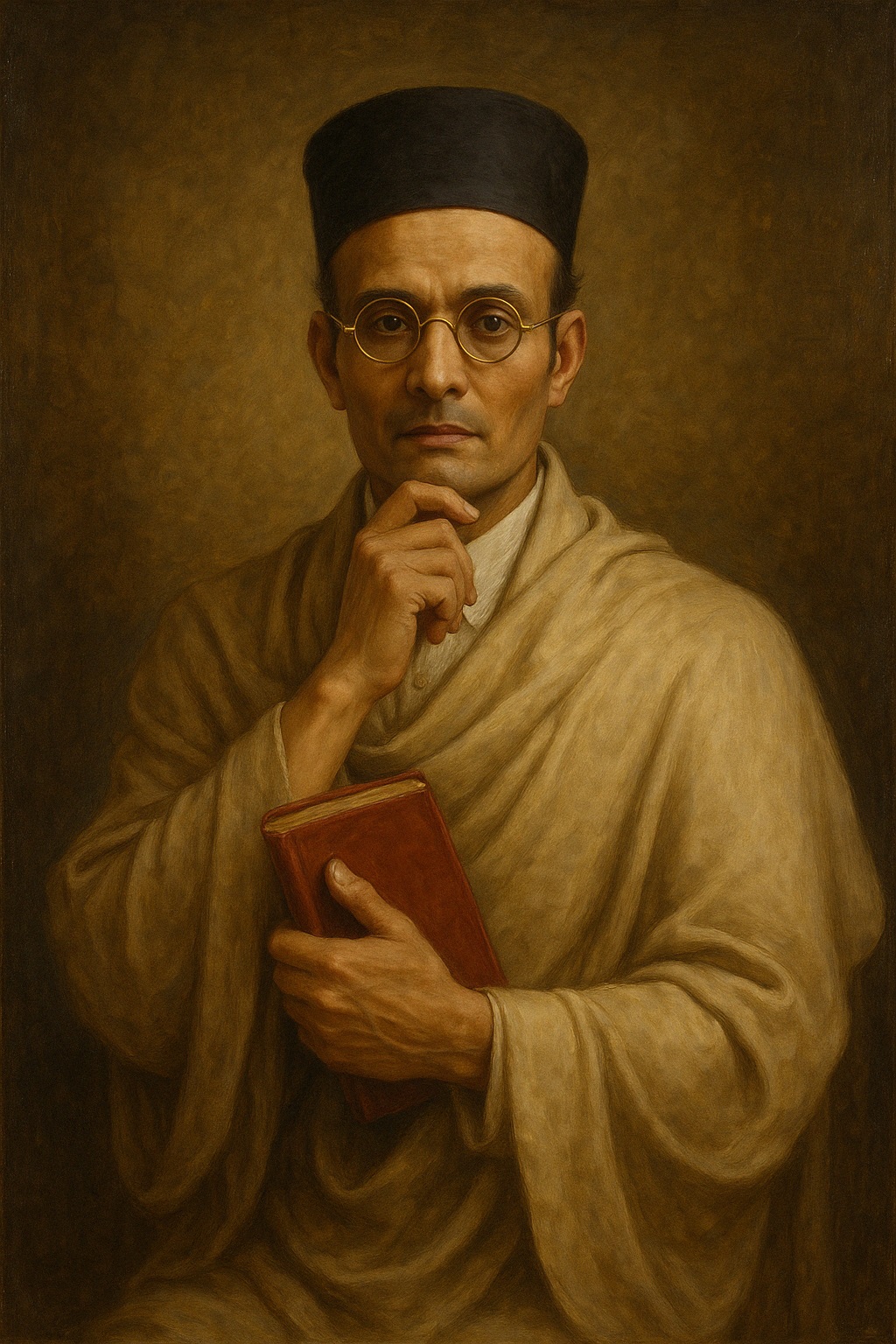Savarkar’s Philosophy & Worldview, Part 1
To comprehend the intellectual foundation of Hindutva and its systematic framework, it is essential to explore Vinayak Damodar Savarkar’s philosophical underpinnings, his worldview, and his perception of humanity. These elements shaped the foundation of his political thought and actions, influencing his vision for India’s future.
Savarkar was deeply influenced by the socio-political climate of his era. The intellectual environment of the late 19th and early 20th centuries, particularly the forces of colonialism and nationalist movements, played a significant role in shaping his ideas. He saw British rule as both a curse and an opportunity—a disruptive force that could be harnessed to forge a new, unified Hindu identity. This perspective aligns with Karl Marx’s notion of colonialism as an “unconscious tool” of historical transformation. Despite British exploitation, Savarkar believed colonial rule had propelled India into a new historical trajectory, igniting transformation processes that could revitalize the lost unity and solidarity of Hindus (Sharma, 1996:191f).
The Philosophical Core of Savarkar’s Thought
In this blog series, we will critically examine Savarkar’s philosophical outlook, his ideological framework, and the fundamental principles guiding his thought. Savarkar remains one of the most debated figures in Indian history—his militant activism, nationalist ideologies, and literary contributions have sparked controversy across academic and public spheres. However, discussions about Savarkar often neglect the core philosophical principles that underpin his views on society, politics, and transformation.
Both Indian and Western scholars have engaged selectively with his writings, analyzing fragmented aspects of his thought without considering the broader philosophical coherence. This blog aims to bridge that gap, presenting a comprehensive evaluation of Savarkar’s worldview and its implications for modern Indian society.
The Challenge of Defining Savarkar’s Philosophy
One of the major difficulties in understanding Savarkar’s philosophy is that he did not articulate a structured theoretical framework. As B. K. Kelkar (1989:53f) observes, Savarkar was fundamentally an active thinker and reformer rather than a systematic philosopher. His philosophy is embedded within his diverse writings—plays, poems, autobiographies—rather than presented as a singular, cohesive doctrine. Consequently, to grasp the depth of his thought, one must extract and analyze the scattered philosophical elements across his works.
This blog series seeks to undertake that task, offering a structured analysis of Savarkar’s fundamental beliefs. By doing so, we hope to highlight the critical variables in his thought process and assess his vision for societal transformation in India.
The Three Premises of Savarkar’s Thought
Savarkar’s philosophy is characterized by three primary premises that form the basis of his social and political thought:
- The Predominance of Western Political and Social Thought – Savarkar’s worldview was heavily influenced by Western political ideologies, particularly utilitarianism, realism, and pragmatic nationalism. His engagement with European political philosophy shaped his understanding of nationhood and governance, leading him to advocate for a rational and structured nationalist movement.
- The Clash of Two Worldviews – Savarkar’s thought reflects the conflict between traditional Indian perspectives and modern Western ideologies. He sought to reconcile these opposing worldviews by formulating a dynamic nationalist ideology that incorporated both traditional cultural elements and modern political strategies.
- Savarkar’s Agnosticism: Religion as a Political Strategy – Unlike many contemporary nationalist leaders, Savarkar viewed religion primarily as a tool for political mobilization rather than a spiritual doctrine. His interpretation of Hindutva was not purely religious but rather a strategic framework to unify Hindus under a common cultural and national identity.
Final Thoughts: A Framework for Further Exploration
By examining these premises in greater detail, this blog series will provide a structured approach to understanding Savarkar’s worldview. His contributions to political thought extend beyond militant nationalism, offering insights into the transformation of Indian society through a rational and pragmatic lens. While Savarkar’s ideas remain a subject of intense debate, a comprehensive study of his philosophical foundation is crucial to evaluating his impact on India’s socio-political landscape.
Stay tuned for our upcoming posts, where we will delve deeper into the intricacies of Savarkar’s thought and its relevance in contemporary discussions on nationalism and identity.
Sources:
KELKAR, B. K. 1989. „Harbinger of Hindu Social Revolution“, in SWATANTRYAVEER SAVARKAR RASHTRIYA SMARAK. 1989. Smarak Inauguration. 28 May 1989. Festschrift. Swatantryaveer Savarkar Rashtriya Smarak: Bombay (Mumbai), 49-51.
KELKAR, B. K. 1989. „Savarkar: A Thee-dimensional view“, in PHAKE, Sudhir/PURANDARE, B. M. and Bindumadhav JOSHI. (Eds.). 1989. Savarkar. Savarkar Darshan Pratishtnah (Trust): (Bombay) Mumbai, 42-60.
SAVARKAR, Vinayak Damodar. 1950. The story of my transportation for life. Sadbhakti Publications: Bombay.
SHARMA, Suresh. 1996. „Savarkar’s Quest for a Modern Hindu Consolidation“, in Studies in Humanities and Social Sciences, Volume II, No. 2, 1996, 189-215, Simla.


Leave a Reply